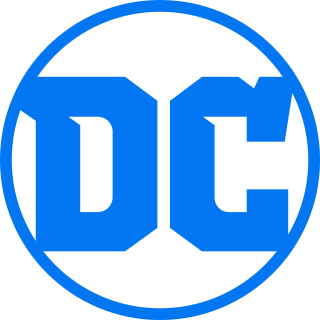
DC Comics, Inc. is an American comic book publisher and the flagship unit of DC Entertainment, a subsidiary of Warner Bros. Discovery.
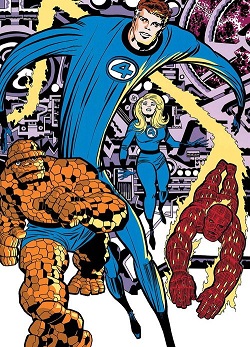
The Fantastic Four is a superhero team appearing in American comic books published by Marvel Comics. The team debuted in The Fantastic Four #1, helping usher in a new level of realism in the medium. It was the first superhero team created by artist/co-plotter Jack Kirby and editor/co-scripter Stan Lee, and through this title that the "Marvel method" style of production came into prominence.

Marvel Comics is an American comic book publisher and the property of The Walt Disney Company since December 31, 2009, and a subsidiary of Disney Publishing Worldwide since March 2023. Marvel was founded in 1939 by Martin Goodman as Timely Comics, and by 1951 had generally become known as Atlas Comics. The Marvel era began in June 1961 with the launch of The Fantastic Four and other superhero titles created by Stan Lee, Jack Kirby, Steve Ditko, and many others. The Marvel brand, which had been used over the years and decades, was solidified as the company's primary brand.

Villains and Vigilantes is a superhero-themed role-playing game which competed primarily with Champions and Superworld in the early to mid-1980s.
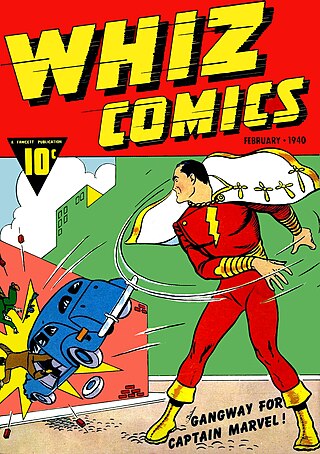
A superhero or superheroine is a stock character who typically possesses superpowers or abilities beyond those of ordinary people, is frequently costumed concealing their identity, and fits the role of the hero; typically using their powers to help the world become a better place, or dedicating themselves to protecting the public and fighting crime. Superhero fiction is the genre of fiction that is centered on such characters, especially, since the 1930s, in American comic books, as well as in Japanese media.

Champions is a role-playing game published by Hero Games designed to simulate a superhero comic book world. It was originally created by George MacDonald and Steve Peterson in collaboration with Rob Bell, Bruce Harlick and Ray Greer. The latest edition of the game uses the sixth edition of the Hero System, as revised by Steve Long, and was written by Aaron Allston. It was released in early 2010.

Eclipse Comics was an American comic book publisher, one of several independent publishers during the 1980s and early 1990s. In 1978, it published the first graphic novel intended for the newly created comic book specialty store market. It was one of the first to offer royalties and creator ownership of rights.

Miss America is a superhero appearing in American comic books published by Marvel Comics. Created by writer Otto Binder and artist Al Gabriele, the character first appeared in Marvel Mystery Comics #49 in the Golden Age of Comic Books. Madeline Joyce is the first incarnation of Miss America. The character has also been a member of the Invaders, Liberty Legion, and All-Winners Squad at various points in her history.
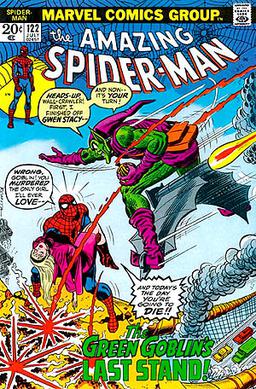
The Bronze Age of Comic Books is an informal name for a period in the history of American superhero comic books, usually said to run from 1970 to 1985. It follows the Silver Age of Comic Books and is followed by the Modern Age of Comic Books.
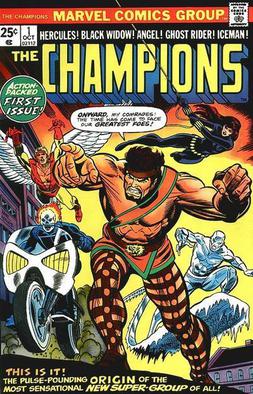
The Champions are a fictional team of superheroes appearing in American comic books published by Marvel Comics. The team first appears in The Champions #1 and was created by writer Tony Isabella and artist Don Heck. Their titular series is regarded as an example of a failed superteam comic, suffering from constant turnover in the writers and artists working on the series, lack of a consistent direction or concept, and mediocre sales.

National Comics Publications v. Fawcett Publications, 191 F.2d 594. was a decision by the United States Court of Appeals for the Second Circuit in a twelve-year legal battle between National Comics and the Fawcett Comics division of Fawcett Publications, concerning Fawcett's Captain Marvel character being an infringement on the copyright of National's Superman comic book character. The litigation is notable as one of the longest-running legal battles in comic book publication history.

The DNAgents is a comic-book series created by writer Mark Evanier and artist Will Meugniot and published by Eclipse Comics from 1983. The series centers on a team of superheroes created through genetic engineering by the Matrix Corporation to act as superhuman enforcers for the head of the company.

Daredevil is a fictional superhero created by Jack Binder, who starred in comics from Lev Gleason Publications during the 1930s–1940s period historians and fans call the Golden Age of comic books before being retroactively established into the Image Universe by Image Comics in the 1990s as its first character. The character is unrelated to Marvel Comics' Daredevil, and recent renditions of the character have often renamed him to avoid confusion and potential lawsuits.
Centaur Publications was one of the earliest American comic book publishers. During their short existence, they created several colorful characters, including Bill Everett's Amazing-Man.
Southern Knights was a comic book created by the husband-and-wife team of Henry and Audrey Vogel. It chronicled the adventures of a superhero team based in Atlanta, Georgia. Initially known as "The Crusaders", they were renamed The Southern Knights with their second issue due to Archie Comics' Red Circle Imprint having their own group called The Mighty Crusaders, though an in-context explanation is proffered in issue #2. Jackson Guice and Chuck Wojtkiewicz both made their comics debut on the series before going on to greater fame with other titles.

Superhero fiction is a subgenre of speculative fiction examining the adventures, personalities and ethics of costumed crime fighters known as superheroes, who often possess superhuman powers and battle similarly powered criminals known as supervillains. The genre primarily falls between hard fantasy and soft science fiction in the spectrum of scientific realism. It is most commonly associated with American comic books, though it has expanded into other media through adaptations and original works.
Richard Renick Hoberg is an American comics artist and animator.

Superhero comics are one of the most common genres of American comic books. The genre rose to prominence in the 1930s and became extremely popular in the 1940s and has remained the dominant form of comic book in North America since the 1960s. Superhero comics feature stories about superheroes and the universes these characters inhabit.
Dennis Mallonee is an American writer and publisher of comic books. He is best known as the writer of the Champions comics and the founder of Heroic Publishing.
Heroic Publishing is an American comic book publisher founded by Dennis Mallonee.














